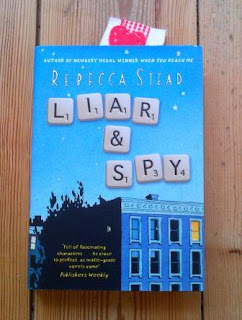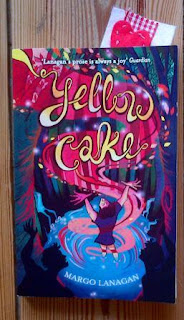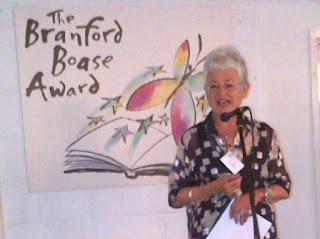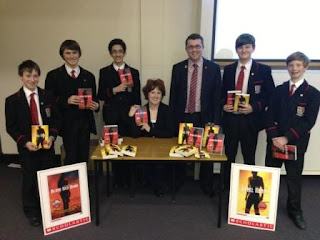Double Daves win the Branford Boase Award 2013 for A Boy and a Bear in a Boat!
The
Branford Boase is an exceptional award in children’s literature as it promotes
debut children’s authors and highlights the guiding role of the editor’s hand
in crafting the published text. This year, author Dave Shelton and editor David
Fickling won it for the unusual and charming A Boy and a Bear in a Boat. I
asked them a bit about working together on editing, covers, reading aloud and the future. Funny and mutually affectionate, it’s
a bit of a boy and a bear story, delightfully told in their own words.....
M:
When reading a novel, I
imagine most readers don't consider the editing processes that shaped it into
its final published form. What sorts of advice or tips did either of you garner
from the other on this particular editing adventure?
 |
| Dave Shelton |
Dave
Shelton:
David is a very subtle, hands off editor. So there weren't many easily
identifiable tips or pieces of advice, so far as I recall. About the only one I
remember was to concentrate on 'the concrete', i.e. to portray the setting and
action of the story through solid description, to make the reader inhabit the
world of the story by making the actual things in the story seem real to them,
to give them heft and weight and solidity. I'm probably explaining this rather
badly. But I took his point and removed several bits of pretty phrasemaking
that actually didn't mean very much if you stopped to think about them for more
than a second. Mostly David only ever made gentle suggestions, and he was
always at pains to stress that I was free to act upon them or ignore them as I
saw fit. I suspect he got his way in almost every instance though. And that's
because he's clever and he's usually right.
M: Having
won the BBA three times, what magic wand are you waving, David?
David
Fickling:
There’s no magic
wand. Winning three BBA’s may be just
luck, but if it isn’t luck it is that I am a ‘potato print’ type publisher, by
which I mean I read it! I Iike it! I publish it! That’s important. To be
decisive. If you really like something and you ‘know’ (as in no one could
dissuade you) it’s good, then, if you are a publisher, it’s important to get on
and do something about it and not to dither too much. In the case of Dave
Shelton I already knew he wrote wonderfully well from his brilliant comic strip
Good Dog Bad Dog. (Read it immediately if you haven’t already). I didn’t really
have to do any research to see if other people like it too. I knew they would. So when Dave said he would like to write
something else I was keen from the off.
When I first read it I liked it immediately. From then on it was just a
case of can I say anything at all that will help him make it exactly what he
wants it to be, as good as it can be. I
don’t think I gave him any tips.
M:
A few of us have said we
think A Boy and a Bear in a Boat would work beautifully as a 'read aloud' story
with younger children. Was reading aloud ever part of the editing process?
 |
| David Fickling |
David
Fickling:
Ha! I think the sound
words make, aloud or in your head, the rhythm of them, is hugely connected to
how good we think the writing is. You can’t really judge a poem without
reciting it yourself. But I don’t
remember Dave or I reading to each other.
Dave
Shelton:
I don't recall reading aloud being part of the editing process as
such, but I think we both talked about whether or not it did read aloud well.
And it was a conscious aim that it ought to. I think I mostly succeeded in
making it a relatively easy ride for parents reading aloud. Although a comics
friend of mine, Glyn Dillon, told me he was press ganged into reading and
rereading it to his son and by the end he rather regretted the early decision
to give the bear a low, growly voice because by the third time through it had
done terrible damage to his throat.
M: The
hardback cover: it's been talked about, it's won awards. Tell us some more.
Dave
Shelton:
The cover is entirely me, save for the blurb text and the placement of
publisher's logo, barcode and suchlike. This is not to diminish the role of
Ness Wood, who designed the book as a whole and did a fantastic job. But the
cover is very much mine. It was very far from the first design I'd proposed.
There had been dozens of thumbnail ideas discarded without showing them to
David, and at least half a dozen more substantial proposed designs that he did
see (and suggested were not quite right) before I came up with an early version
of the eventual design. The problem had partly been that I'd been second
guessing what I thought David (and everyone else at David Fickling Books, and
at the sales and marketing departments at Random House) might want rather than
just doing what I wanted. Once I did that I very quickly came up with something
that I liked very much but that I only showed to David out of interest, not
with any serious expectation of it ever becoming the actual cover. Then he
almost immediately okayed it, much to my amazement.
This
is, as I understand it, a virtually unheard of level of control for any author
to have over his or her book cover, let alone somebody as unestablished as I
am.
 Now, obviously, most authors aren't also illustrators or designers, so you
wouldn't expect them to create their own designs but I do find it surprising
how little say even very well known and successful authors seem to have in how
their books are presented to the world. Some of my favourite authors' books
almost always have terrible covers. I wonder if they don't know, or if they
don't care, or if they care very much but have given up trying to argue.
Now, obviously, most authors aren't also illustrators or designers, so you
wouldn't expect them to create their own designs but I do find it surprising
how little say even very well known and successful authors seem to have in how
their books are presented to the world. Some of my favourite authors' books
almost always have terrible covers. I wonder if they don't know, or if they
don't care, or if they care very much but have given up trying to argue.
But I
want them to argue. I want them to be saying 'you are NOT going out dressed
like that! Now wipe off that filthy foil type and make yourself presentable!'
Although, in fairness, I don't actually object to a bit of garish trashiness as
much as I do to the really dull ones that are just a bit of type bunged over a
stock photo that make no statement at all about the book they ought to be
representing, as if the main intention is not to attract the kind of reader who
might enjoy this particular book, but instead to avoid putting anybody off
(even the readers who would definitely hate it).
I think a good cover should
say something about the book. And that's why I'm proud of the hardback cover
for A Boy and a Bear in a Boat: it's odd, and seemingly rather low on content,
but closer observation rewards the curious reader. At least that's the hope.
David Fickling:
I
love the cover and it is entirely down to Dave.
It makes me smile every time I look at it. We publishers often judge too
quickly. Luckily we waited for this cover to arrive. I don’t know if that is unusual, but I just
loathe a cover going out on a book when it is not right. That doesn’t mean I
know what the cover should be. I couldn’t make a cover to save my life. So for me it really isn’t a problem waiting
for the right one to come along. If
you’re going home, no point in taking a bus that doesn’t go that way, might as
well wait. Waiting can be both tedious and nerve wracking. Has the last bus
gone? Should I have got on the one that
at least drops me two miles from my house?
M: Looking
to the future and an imminently independent David Fickling Books, what can we
expect?
Without giving too much away David Fickling said: “They are going to be good. I’m crossing my
fingers that one of them will be by Dave Shelton.” Luckily for him, the other
Dave hopes “to be continuing to
contribute to DFB's output for as long as they'll have me.” Good news all round
then.
A Dave and a David in a boat....?
**********
Here's my review of A Boy and a Bear in a Boat.














